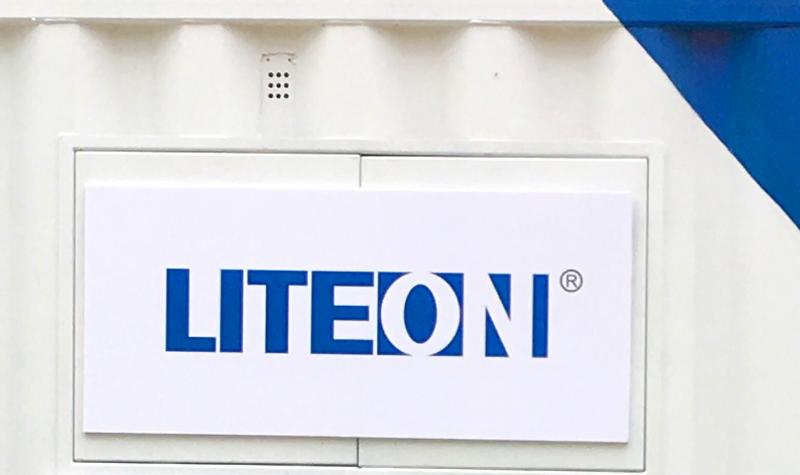Electronic components supplier Lite-On Technology Corp (光寶科技) yesterday reported that net profit last quarter fell 4 percent year-on-year to NT$2.99 billion (US$103.37 million), from NT$3.11 billion in the same period last year.
That translated into earnings per share (EPS) of NT$1.29, down from NT$1.34 a year earlier. On a quarterly basis, net profit contracted 13 percent from NT$3.45 billion, or EPS of NT$1.48, in the second quarter.
Gross margin increased to 19 percent from 16.2 percent in the third quarter last year, which was a decline from 19.4 percent in the second quarter.

Photo: Chen Rou-chen, Taipei Times
Operating profit for the third quarter grew 23 percent year-on-year to NT$3.99 billion from NT$3.35 billion, as the company recognized a substantial asset impairment loss.
‘NO IMPACT’
“In surveying the current state and likely future trends of the global CD-ROM reader industry, we have decided to recognize a goodwill impairment of about NT$700 million,” the company said in its revenue statement.
The impairment would have “no impact” on cash flow or revenue, the statement added.
Lite-On president Anson Chiu (邱森彬) said that he sees the work-from-home trend continuing through the first half of next year.
“As long as COVID-19 is still around, the demand [for work-from-home equipment] would still be around,” Chiu said, adding that “we will continue to see double-digit percentage growth in revenue from laptop-related products in the fourth quarter on a year-on-year basis.”
‘GOOD NEWS’
He is also optimistic that Lite-On’s automotive and 5G-related product categories would see positive movement next year.
Chiu also said there would be “good news” for the company’s 5G base stations in the first quarter next year.
Lite-On’s automotive products would also start contributing more seriously to revenue, he added.
“As Lite-On sheds underperforming departments, we expect gross margin and operating profit margin to keep improving in the fourth quarter on a year-on-year basis,” Chiu said.
Third-quarter revenue fell 14 percent to NT$41.33 billion from NT$48.16 billion in the third quarter last year.
Cumulative net profit for the first three quarters was NT$8.01 billion, a 15 percent increase year-on-year.
EPS for that period were NT$3.45, up from NT$3 from a year earlier.

TECH CLUSTER: The US company’s new office is in the Shalun Smart Green Energy Science City, a new AI industry base and cybersecurity hub in southern Taiwan US chip designer Advanced Micro Devices Inc (AMD) yesterday launched an office in Tainan’s Gueiren District (歸仁), marking a significant milestone in the development of southern Taiwan’s artificial intelligence (AI) industry, the Tainan City Government said in a statement. AMD Taiwan general manager Vincent Chern (陳民皓) presided over the opening ceremony for the company’s new office at the Shalun Smart Green Energy Science City (沙崙智慧綠能科學城), a new AI industry base and cybersecurity hub in southern Taiwan. Facilities in the new office include an information processing center, and a research and development (R&D) center, the Tainan Economic Development Bureau said. The Ministry

ADVERSARIES: The new list includes 11 entities in China and one in Taiwan, which is a local branch of Chinese cloud computing firm Inspur Group The US added dozens of entities to a trade blacklist on Tuesday, the US Department of Commerce said, in part to disrupt Beijing’s artificial intelligence (AI) and advanced computing capabilities. The action affects 80 entities from countries including China, the United Arab Emirates and Iran, with the commerce department citing their “activities contrary to US national security and foreign policy.” Those added to the “entity list” are restricted from obtaining US items and technologies without government authorization. “We will not allow adversaries to exploit American technology to bolster their own militaries and threaten American lives,” US Secretary of Commerce Howard Lutnick said. The entities

Minister of Finance Chuang Tsui-yun (莊翠雲) yesterday told lawmakers that she “would not speculate,” but a “response plan” has been prepared in case Taiwan is targeted by US President Donald Trump’s reciprocal tariffs, which are to be announced on Wednesday next week. The Trump administration, including US Secretary of the Treasury Scott Bessent, has said that much of the proposed reciprocal tariffs would focus on the 15 countries that have the highest trade surpluses with the US. Bessent has referred to those countries as the “dirty 15,” but has not named them. Last year, Taiwan’s US$73.9 billion trade surplus with the US

The Taipei International Cycle Show (Taipei Cycle) yesterday opened at the Taipei Nangang Exhibition Center, with the event’s organizer expecting a steady recovery in the industry this year following a tough last year. This year, 980 companies from 35 countries are participating in the annual bicycle trade show, showcasing technological breakthroughs and market development trends of the bicycle industry at 3,600 booths, the Taiwan External Trade Development Council (TAITRA, 外貿協會) said in a statement. Under the theme “Ride the Revolution,” the exhibition has attracted more than 3,500 international buyers from 80 countries to preregister for the four-day event, which is expected to